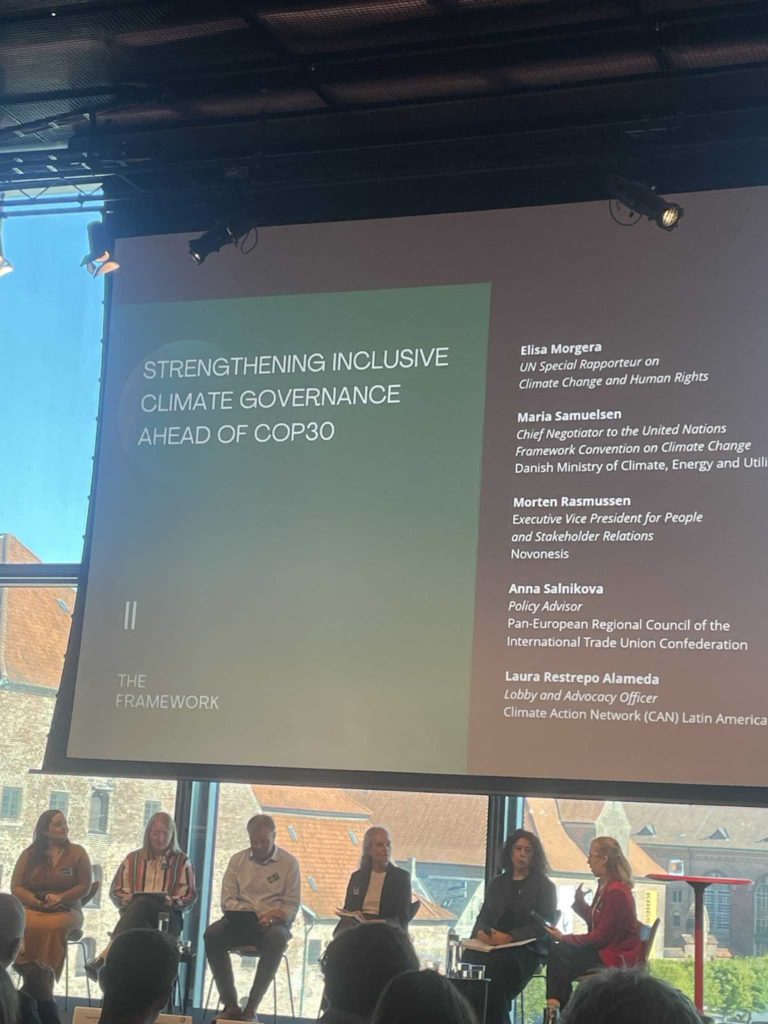Climate Action Needs Democracy and Democracy Needs Civil Society
Reflections from the Climate Democracy Conference, Copenhagen

With COP30 fast approaching, last week’s Climate Democracy Conference in Copenhagen offered a timely opportunity to reflect on the state of climate action, democratic governance, and the vital role of civil society in advancing a global just transition.
Co-hosted by Climate Action Network (CAN) Europe and Global Focus, the conference brought together civil society organisations, policy-makers, youth activists, and frontline defenders to explore the intersection between climate ambition and democratic values and how both must be strengthened to meet the challenges ahead. Our partnership with Global Focus on this conference is part of CAN Europe’s ongoing work to amplify and protect diverse voices in the climate debate, in close cooperation with the CAN International global network, especially the CAN nodes in the Global South, focused on driving collective and sustainable action to fight the climate crisis and achieve social justice.
As the impacts of the climate crisis become increasingly visible, the urgency of climate negotiations is palpable. Belém, at the heart of the Amazon, is a powerful symbol of this urgency. This region is home to vital ecosystems and a crucial regulator for the global climate. It is also the home to hundreds of Indigenous and traditional communities, communities that are highly vulnerable to climate change related impacts and are often the frontline defenders of biodiversity, forests and ancestral lands, as well as defenders of their own human rights. Yet these same communities face escalating threats, including violence and criminalization. Hosting COP30 in Belém offers a critical moment to amplify their voices and demand climate policies rooted in justice and strong protections for environmental defenders.
At the same time, the political landscape presents growing challenges. COP30 marks the 10th anniversary of the Paris Agreement – a milestone that should be a moment of reflection and renewed commitment. Yet, despite the escalating urgency for climate action since 2015, civil society around the world is experiencing shrinking civic space, increased smear campaigns, criminalization of activists, and barriers to meaningful participation in climate governance. These trends risk undermining the democratic foundations essential for credible climate action.


Key Takeaways: Advancing Just, Inclusive and Rights-Based Climate Action
The Climate Democracy Conference highlighted a key takeaway:
Climate action needs democracy and democracy needs civil society.
To this end, to advance effective, inclusive, and rights-based climate governance, the following priorities emerged as critical for COP30:
Ensure meaningful, inclusive participation at all stages of climate policy
Civil society, Indigenous Peoples, youth, persons with disabilities, and other rights-holders must not only be present – they must be genuinely heard and empowered in the design, implementation, and review of climate policies. Participation must be more than symbolic. COP30 must not only deliver ambitious climate outcomes but also ensure inclusive, transparent, and equitable participation for all, especially those most affected. This is a shared priority with our sister node, CANLA (Climate Action Network Latin America), and we are committed to supporting their efforts to promote meaningful participation across the region.
Embed rights-based approaches across all levels of climate diplomacy
From defending freedom of expression and assembly to supporting independent media and scientific integrity; transparency and accountability must be upheld in line with international conventions like the Aarhus Convention.
Protect and support environmental and human rights defenders
Legal protections are essential but so is capacity building, particularly for those on the frontlines. This includes mental health support for communities living under threat, and stronger safeguards for those defending land, forests, water, and human rights.
The EU must lead with a rights-based, 1.5°C-aligned NDC supported by legal obligations
The EU must adopt a credible and ambitious NDC that includes a clear fossil fuel phase-out, accelerates renewable energy, and guarantees civic space. The International Court of Justice’s recent advisory opinion reinforces the legal obligation of states to pursue the highest possible ambition under the Paris Agreement.
Make representation real: avoid tokenism
To ensure legitimacy and impact, the participation of civil society, particularly from the Global South, must be adequately funded, resourced, and supported. Bridging these gaps is not optional. It is rather a matter of fairness and effectiveness.
Close the gap in climate finance, adaptation, and justice
The conference reminded us that adaptation, loss and damage, and climate justice still lack sufficient financial and political support. There are high-level commitments, but real money is still missing, especially for those already experiencing climate impacts. Questions were raised about the role of private capital and whether international legal frameworks are enabling or hindering the flow of resources to where they are most needed.
Reframe the narrative: it’s about sustaining life on Earth
Changing the narrative that climate change is not just another crisis; it is about maintaining the life-supporting systems on Earth. Therefore, the transition cannot be just technical – it must be transformational. This requires a new narrative that rethinks power, equity, and responsibility through a decolonial lens: challenging historical injustices, shifting away from extractive models, and centering the voices, knowledge, and rights of those who have been historically marginalized. Hence, human rights are not peripheral to the climate agenda but they are rather its foundation.
Challenging Comfort and Privilege
Finally, meaningful change requires challenging who benefits from the current system. We cannot expect transformative climate action while clinging to comfort and privilege – real transition demands sacrifice, courage and urgent action.
Protecting our planet means protecting the democratic and human rights foundations that enable collective action. Climate democracy is not optional, but it is essential. We hope to see these messages put forward and acted on at COP30.



